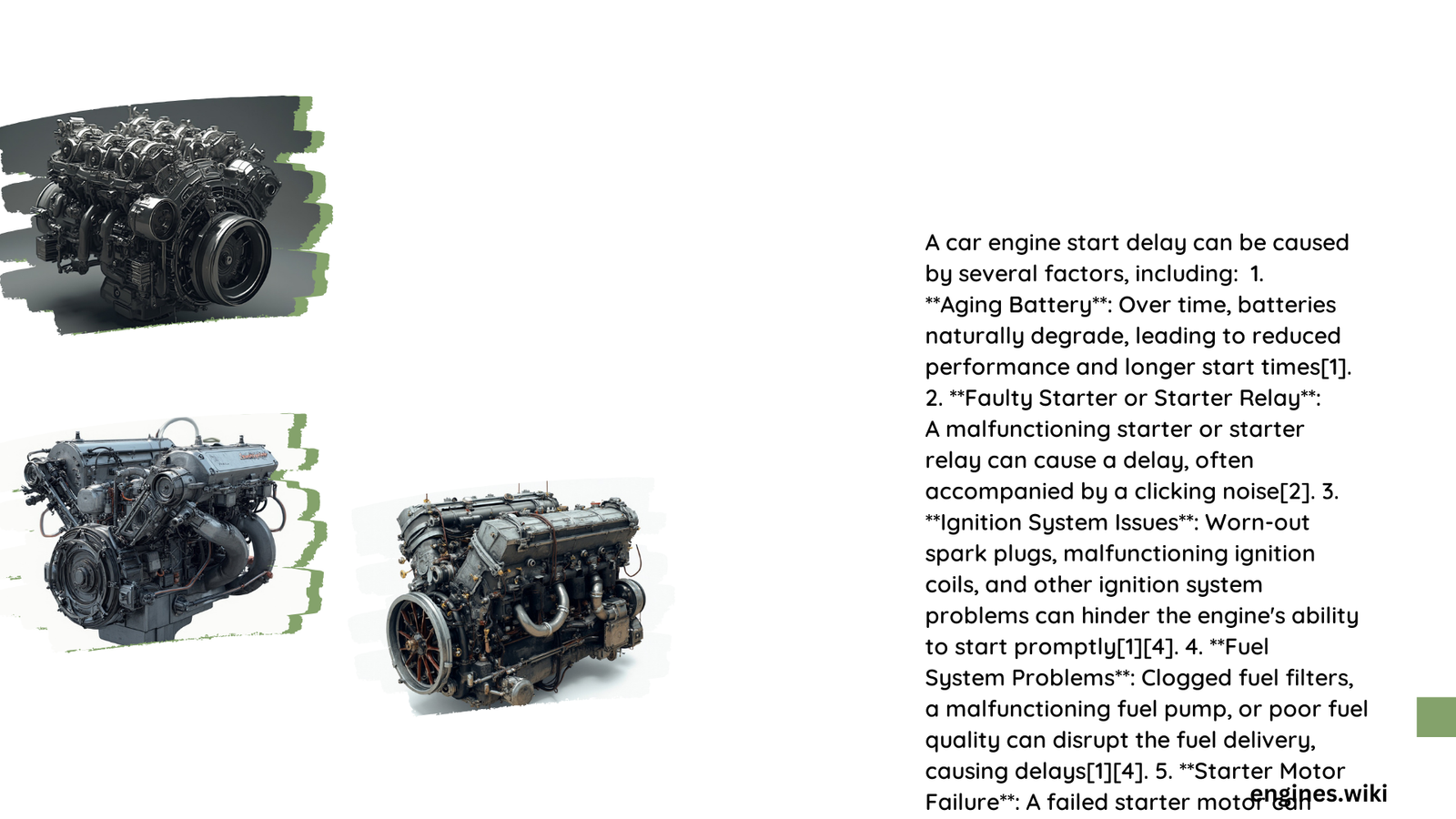Car engine start delay is a common issue that can be frustrating for drivers. It occurs when there’s a noticeable lag between turning the key or pressing the start button and the engine actually firing up. This problem can stem from various factors, including battery issues, fuel system problems, or ignition system malfunctions. Understanding the causes and knowing how to diagnose and address them can save time, money, and prevent potential breakdowns.
What Are the Common Causes of Car Engine Start Delay?
Several factors can contribute to a car engine start delay:
- Weak or dying battery
- Corroded battery terminals
- Faulty starter motor
- Clogged fuel filter
- Malfunctioning fuel pump
- Worn-out spark plugs
- Faulty ignition switch
- Issues with the engine control module (ECM)
Let’s dive deeper into each of these potential causes and their solutions.
How Does Battery Health Affect Engine Start Time?

The battery is crucial for starting your car. A weak or dying battery can significantly impact the engine’s ability to start promptly.
Key Battery Health Indicators:
- Voltage: A healthy battery should maintain at least 10.5 volts during cranking.
- Cranking Speed: Normal cranking speed ranges from 150-300 RPM, depending on the vehicle.
| Battery Condition | Voltage During Cranking | Typical Cranking Speed |
|---|---|---|
| Healthy | Above 10.5V | 150-300 RPM |
| Weak | Below 10.5V | Below 150 RPM |
If your battery’s voltage drops below 10.5V during cranking or if the cranking speed is consistently low, it’s time to consider replacing your battery.
What Role Does the Fuel System Play in Start Delays?
The fuel system is responsible for delivering the right amount of fuel to the engine at the correct pressure. Issues in this system can lead to start delays.
Fuel Pressure Specifications:
- Optimal fuel pressure for gasoline engines: 30-50 PSI
If the fuel pressure falls below this range, it could indicate:
- A failing fuel pump
- A clogged fuel filter
- Leaks in the fuel lines
To diagnose fuel system issues:
- Use a fuel pressure gauge to measure pressure at the fuel rail.
- Check and replace the fuel filter if necessary.
- Inspect fuel lines for any visible damage or leaks.
How Can Ignition System Malfunctions Cause Start Delays?
The ignition system is responsible for creating the spark that ignites the fuel-air mixture in the engine. Problems here can lead to difficult starts or complete failure to start.
Key Components to Check:
- Spark Plugs: Worn or fouled spark plugs can cause start delays.
- Ignition Coils: These should have specific resistance values:
- Primary resistance: 0.5-2 ohms
-
Secondary resistance: 5,000-10,000 ohms
-
Spark Plug Wires: Check for cracks or damage.
To diagnose ignition system issues:
- Use a spark tester to check for spark at the plugs.
- Measure the resistance of ignition coils.
- Visually inspect spark plug wires for wear or damage.
What Diagnostic Steps Should Be Taken for Start Delays?
When faced with car engine start delays, follow these diagnostic steps:
- Battery Health Check:
- Measure battery voltage during cranking
- Perform a load test
-
Inspect and clean battery terminals
-
Ignition System Check:
- Test spark plugs with a spark tester
- Measure ignition coil resistance
-
Inspect ignition module and wires
-
Fuel Delivery Check:
- Measure fuel pressure at the fuel rail
- Inspect and potentially replace the fuel filter
- Test the fuel pump functionality
What Maintenance Practices Can Prevent Start Delays?
Regular maintenance can prevent many causes of car engine start delays:
- Battery Maintenance:
- Clean terminals regularly
- Perform annual load tests
-
Replace battery every 3-5 years
-
Ignition System Maintenance:
- Replace spark plugs every 30,000 to 100,000 miles
-
Replace ignition coils if they show signs of failure
-
Fuel System Maintenance:
- Replace fuel filter every 15,000 to 30,000 miles
- Have the fuel pump tested during regular service intervals
| Maintenance Task | Frequency | Estimated Cost |
|---|---|---|
| Battery Replacement | Every 3-5 years | $50-$200 |
| Spark Plug Replacement | 30,000-100,000 miles | $5-$20 per plug |
| Fuel Filter Replacement | 15,000-30,000 miles | $10-$30 |
By following these maintenance practices and being aware of the potential causes of car engine start delays, you can ensure your vehicle starts reliably and avoid the frustration of unexpected delays.
